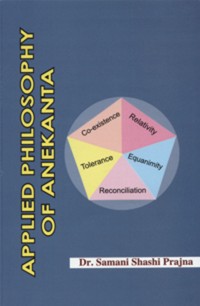Anekānta is a form of knowledge and anekāntika substance is the object of knowledge. The basis of anekānta is the nature of reality (sat) or substance. The nature of the substance in itself is permanent and temporary. It does not make any difference if it is known by an ordinary man or an omniscient. The only difference is that a common man knows it through the sensuous knowledge whereas the omniscient knows it through the direct knowledge. The theory of anekānta is of universal application. Substance cannot exist without mode; therefore it applies to substance; mode cannot exist without substance; therefore it applies to mode. The transcendental existence and empirical existence are not absolutely separate in the Jain philosophy. The mode is empirical existence and the substance is transcendental existence; but they are inseparably joined together. Both of them are two aspects of the same existence and therefore, they cannot be conceived of as absolutely independent.
If existence is to be propounded even by an omniscient, he will have to use syādvāda and saptabhaṅgī as similar is the case with an ordinary man. When substance in itself is permanent and temporary, how can the omniscient express it in absolute terms? He will have to use the language of syādvāda. For example substance is relatively (i.e. with respect to a particular point of view) permanent and relatively temporary from different point of view.
 Dr. Samani Shashi Pragya
Dr. Samani Shashi Pragya

